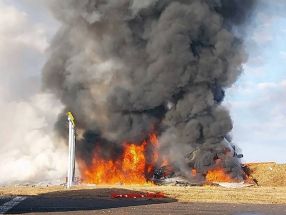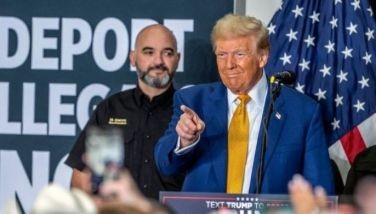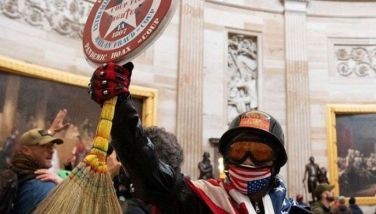With Obama out, other leaders take APEC main stage
BALI, Indonesia (AP) — Japanese Prime Minister Shinzo Abe and other Asia-Pacific leaders took center stage Monday at a regional summit after President Barack Obama was a no-show due to the U.S. government shutdown.
Leaders of the Asia-Pacific Economic Cooperation forum, meeting amid tight security on this tropical island in eastern Indonesia, urged faster work on reforms meant to break down trade barriers and improve competitiveness.
Abe, struggling to extricate Japan from two decades of stagnation, pledged to move ahead with reforms he has promised as part of his "Abenomics" economic strategy.
"It's not easy for a country stuck in deflation for 15 years to get out," Abe said. He promised measures to ensure that an increase in Japan's sales tax, which has driven consumer confidence to record lows, does not derail the economic recovery he has nurtured since taking office last December.
"Now we can wipe out the doom and gloom atmosphere in the Japanese economy," Abe said.
Speaking to a gathering of business and political leaders, he also sought to reassure other Asian countries, especially those that suffered colonization and invasion before and during World War II, over Japan's efforts to upgrade its military.
"We are aspiring to become a pro-active contributor to stability and security in the world as a country that observes international norms," Abe said.
The reference to international norms also appeared aimed at China, whose naval incursions into waters near disputed islands in the East China Sea have angered Japan. Relations between the two biggest Asian economies remain chilly with scant sign either is willing to compromise on the islands issue.
APEC's 21 nations and territories have wide disparities in wealth and development, ranging from tiny Brunei to the U.S. and China, the world's two biggest economies. The region accounts for more than 3 billion people and over half of global GDP. The annual APEC gathering gives regional leaders the opportunity to thrash out policies to encourage trade and business cooperation, while also tackling country-to-country issues in meetings on the sidelines. It also is a boon for this year's host Bali, which has struggled to rebuild its tourism industry following terrorist attacks in 2002 and 2005 that killed over 200 people.
For Obama, it was an opportunity to underline renewed U.S. attention to Asia as a counterbalance to China's increased economic, political and military clout. But that message was undermined by the U.S. government shutdown forcing Obama to cancel his trip to Indonesia and three other countries. Later Monday, attention will focus on addresses by the leaders of two key U.S. rivals, Russia's Vladimir Putin and China's Xi Jingping. U.S. Secretary of State John Kerry will try to fill the vacuum left by Obama's change of plans.
Meanwhile, the dozen countries involved in the U.S.-led Trans-Pacific Partnership were haggling over their plans for a free trade area they hope will eventually encompass the entire region.
A draft declaration for the APEC summit, obtained over the weekend, also calls for at least partial progress on stalled talks on dismantling trade barriers under the World Trade Organization.
Indonesian trade minister Gita Wirjawan, whose country is not involved in the U.S.-led free trade initiative but is part of a separate regional grouping, said Indonesia is not against the Pacific pact but needs more time to decide whether to join it.
"We need to evaluate whether it will be net beneficial to us," Wirjawan told The Associated Press. "We're observing."
Indonesia's garment industry suffered after a free trade arrangement with Beijing opened its market to cheaper exports from China,
"Yes, there has been a deficit but let's not forget the fact that every dollar of trade, whichever way, involves the creation of jobs," Wirjawan said. "I think that fact that China is our biggest trading partner is very, very important for Indonesia."
He said that during a recent visit by Chinese President Xi Jinping, the two sides signed agreements on joint ventures amounting to about $22 billion-$23 billion.
"They're real joint venture agreements and capital that will be poured into sectors that are value-added for the Indonesia story," he said.
APEC's eventual goal is a "free trade area of the Pacific" — still a remote possibility given the various territorials issues and other differences dividing its nearly two-dozen members.
Wirjawan said there are grounds to think that people believe more in the existence of UFOs than the benefits of free trade. For developing countries particularly, where some industries lack the competitive sophistication of those in rich countries, it is easier to argue for free trade when there are visible signs of its benefits such as factories and jobs, he said.
- Latest
- Trending




























